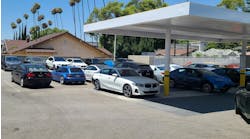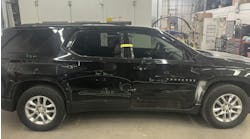Editor's Note: This article has been refreshed since its original May 2011 publication without edits.
Most people in the collision industry have bought and sold many cars. By the time I was 21 years old, I'd owned 23 vehicles. I don't even know how many I've purchased and sold in my lifetime, but it's a lot.
When I sold those vehicles, I usually did so from a base of knowledge about the vehicles' value. I looked up other cars like mine that sold recently and found out everything I could to make sure I was getting top dollar for my car. I assume you've done, and would do, the same thing.
When the time comes for you to retire or move on to a new endeavor, it makes sense to get the most out of your business once you decide to sell it. It's not easy to look up a collision shop for sale and get an idea of what your business is worth. Too many variables come into play to do this. In fact, valuing your business fairly can be a daunting task that can leave you frustrated and confused. However, with a few simple pointers, you can value your shop accurately and start traveling on the road to retirement.
The basics
Placing a value on a business is like placing an accurate value on a total loss vehicle. A compilation of recent sales, NADA or red book value, market area and condition will net the most accurate value. The same holds true with a business valuation. A compilation of information will provide the best evaluation. You may want to determine a fair value for a bank loan, or just for your own information. However, the most common reason is determining a selling price.
Don't consider trying to sell your business without putting together the following basic information first.
- Keep your emotions out of the sale. You may have devoted your entire life to building and expanding your shop. This effort has a tremendous value to you but might be considered "blue sky" to potential buyers. No one will pay for blue sky. All that matters in a business valuation are assets, business goodwill from a successful shop and processes that produce verifiable and measurable value or return on investment.
- Have accurate financials for review. The more detailed your information, the better, even if your financials show little or no profitability. Use at least three years of your numbers in your valuation, and if someone is interested in buying your shop, they'll want copies. Part of buying a business is the potential for future growth and success in that business. Your past efforts will show direction to a potential buyer in this area.
- Know where your business is coming from. Make sure you have these sources documented and available for review by a potential buyer after a nondisclosure agreement has been signed.
If you own the real estate involved with your business, know its value. Talk with a local real-estate agent if needed.
- Put together an asset/equipment list with itemized values for every piece of equipment on it. Include office equipment and shop equipment. Make sure you include company vehicles if these are included in the sale. Don't use the prices you paid for the equipment. Consider its current value, not its replacement cost.
Valuation methods
If you haven't changed your mind about selling after putting together all this information, you're ready to start projecting your shop's value. There are several accepted methods to use when doing this. No single method is 100-percent accurate or accepted as the best or most accurate. Remember, your shop will be worth what someone is willing to pay for it – within the pricing guidelines you calculate. Here are five common valuation methods:
- Multiple of earnings. For many years, this method has been used by buyers to place a quick value on a business for sale. With this method, a value between one and five is used as a multiplier of the earnings before interest and taxes (EBIT) number. The better the outlook for the future success of the business, the higher the multiplier.
For example, a shop for sale produced an EBIT number of $150,000 last year. It has produced higher numbers every year for the past three and it just added a large direct repair program. It has a good outlook for future growth. In this scenario, you might multiply $150,000 by four, the highest multiplier, to net a value of $600,000.
In many cases, earnings are adjusted to take out income taxes, nonrecurring income and expenses, nonoperating income and expenses, depreciation and amortization, interest expense or interest income and owner compensation. The multiplier is the key, and the correct number will be debatable. Sellers will want to use the higher number and buyers, the lower. Most industries have an average number for this process. I've heard the average in the collision industry is three.
- Asset valuation. With this method of valuing a business, take all the values calculated earlier, real estate and equipment values, and add them together to determine a net value. In true asset valuation, there's no consideration given to the intangible values of the business, only the hard assets. This method is generally used for short sales and liquidations, when selling quickly is desired.
This method may apply to you if you're not doing well in the business and sales are declining every year, or you just want to cash out. There are occasions when a buyer will have no interest in your business and only wants the real estate because it's in a good location for another type of business. In such a case, you may be able to do better by selling your business, assets and real estate separately.
- Market approach. This method is grounded in the basics of economics, in which the time-tested fundamentals of supply and demand determines price. The method works like this: A business is a machine built for the purpose of making money. The more money it makes, the more it's worth. If your shop is a little outdated, but you make a great living from it, it'd likely be worth more in the marketplace than the shop down the street with expensive overhead that nets little cash for its owners, even if it's newer and has nicer equipment. There's value in having built a successful and profitable business. However, that value is open to interpretation.
- Structure of the deal or sale. The terms of a transaction are important to calculate the price. When sellers demand all cash for their businesses, they can expect to receive about 60 percent of the asking price by accepting a smaller down payment and offering to finance the balance.
It's easy to understand why deal structure is such an important part of the valuation process. For a business to be affordable, cash flow needs to be strong enough to support the sale price. A deal that forces a buyer to produce a lot of cash up front, in relation to the projected cash flow, will place a much larger strain on a potential buyer. This could mean a business will be interesting to a buyer only at a low price.
However, if a potential buyer is able to use less cash up front and has the ability to make payments to the seller to purchase the business, it's likely you'll be able to negotiate a much higher sales price.
Creative deal structures always will help sell your business and usually will allow you to list it at a higher price. Many first-time shop owners aren't flush with cash. If you can offer the possibility of owner financing, you may be able to get the best of both worlds because you'll give someone the opportunity to buy your business with less up front cash and you'll have a guaranteed income for years to come. If the new owner defaults, you still own the property and assets and can resell them.
- Hire a professional. It's possible that after all your careful and exhaustive research you may not feel secure in your valuation. Or, you might just want to get another professional opinion to solidify your appraisal. If this is the case, consider hiring a professional business broker to value and list your business for sale. Brokers have access to a lot of historical data and will be able to determine an accurate value for your business.
Also, consider hiring an appraisal service instead of a broker. There are many appraisal services that can provide you with the appropriate information.
These services come at a cost and may not provide you with any more accurate information than you can compile on your own with diligent research. Check with your local Better Business Bureau for an appraiser that is endorsed by them.
Put together verifiable and accurate information. Again, don't let emotions rule your judgment. You may want to enlist the help of a trusted friend or relative, who will be able to look at your specific situation without an emotional attachment, to sift through your numbers. Be able to back them up with facts about what you're selling, and your pricing will fall into place. Potential buyers will be less likely to negotiate your price down if it's based on verifiable facts.
Remember, valuing a business is as much an art as it is a science. It's like fixing a car. Potential sellers who take a look at the complete package – the deal structure and selling price – usually are the ones who are successful in valuing their business accurately.





